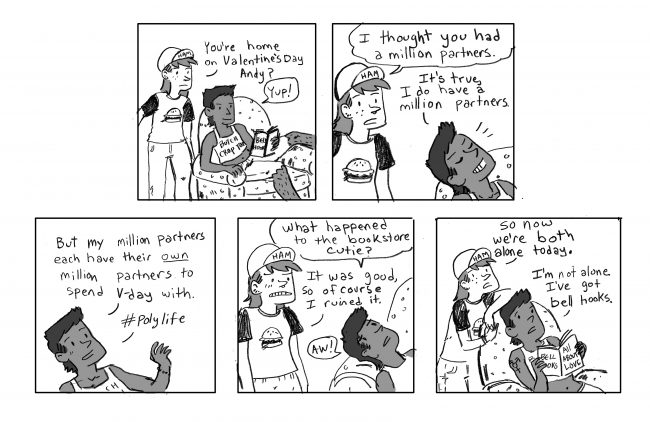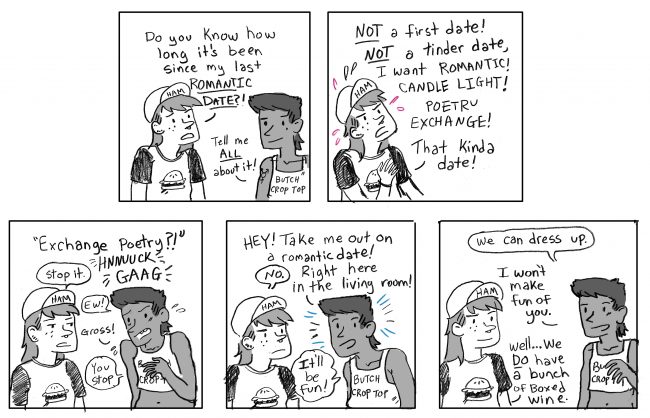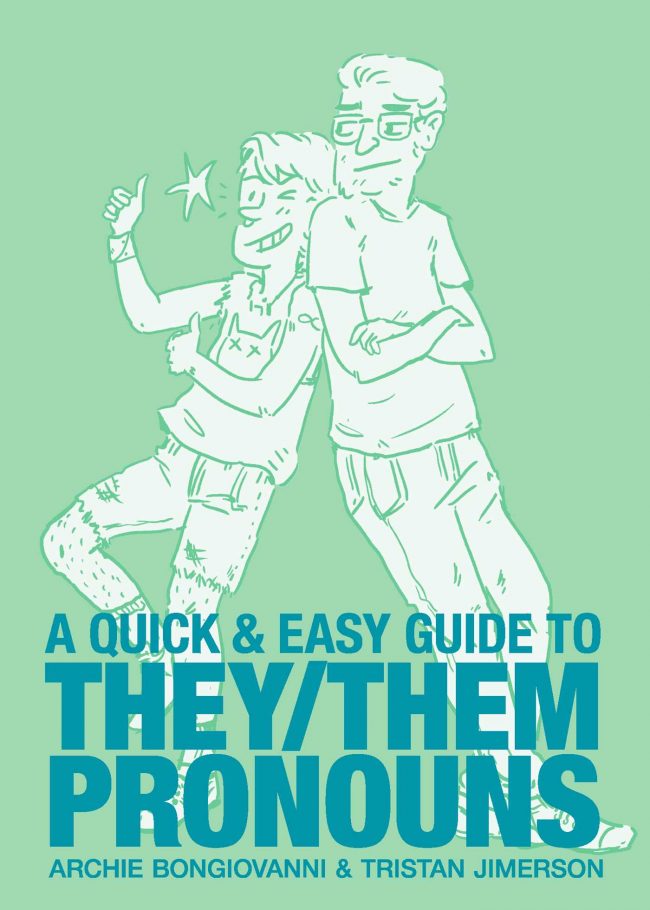 Archie Bongiovanni’s rollicking, thoughtful, nuanced, funny comic strip Grease Bats, originally serialized on queer website Autostraddle, has finally been collected in a trade paperback from Boom! Box. From Archie’s debut with their graphic novel Out of Hollow Water from 2D Cloud, they established an unwavering desire to expose the weirdness in life. Grease Bats continues to run on Autostraddle, and Limerence Press put out A Quick & Easy Guide to They/Them Pronouns, co-authored with Tristan Jimerson.
Archie Bongiovanni’s rollicking, thoughtful, nuanced, funny comic strip Grease Bats, originally serialized on queer website Autostraddle, has finally been collected in a trade paperback from Boom! Box. From Archie’s debut with their graphic novel Out of Hollow Water from 2D Cloud, they established an unwavering desire to expose the weirdness in life. Grease Bats continues to run on Autostraddle, and Limerence Press put out A Quick & Easy Guide to They/Them Pronouns, co-authored with Tristan Jimerson.
I spoke with Archie over email. —Annie Mok
ANNIE MOK: Carta Monir's blurb on the back of Grease Bats states a common reflection about your work, which is that reading the comics feel like hanging with good friends. With the book centering so much around friendship and community, I imagine your own friends and community have contributed to these fictional stories to some effect. What has it been like getting to know these characters, and how did they appear for you at first? Have they grown and changed over time in contrast to what you originally thought of them?
 ARCHIE BONGIOVANNI: It has been a total joy to draw Andy and Scout for over five years, they've definitely grown but remain the nuanced characters I tried to make them into at the start of the comic. Ari, Taylor and Gwen have also been fun to draw and develop over the years. I know these characters better than I know myself at times! Each character within Grease Bats is a reflection of friends and people within my community, all mixed up in a bunch of tiny small ways, so that there is no single person that a character is based off of. I'm hoping that makes them more well-rounded and individualized characters versus a characterization of one single person. I also think this means that readers can relate to more characters instead of just identifying with one of them. In a way, both Andy and Scout came about from my own personality, my more extravagant, showy, extroverted side developing into Andy and the more insecure, shy, and anxious side of myself becoming Scout. Although, the two of them have way more depth and heart than just a list of personality traits. I think some of my favorite comics are when they have to realize something about their own personality that is changing, like this comic where Andy is less extroverted than they told themselves they are. Or this comic where Scout makes a mistake that goes against their usual moral compass.
ARCHIE BONGIOVANNI: It has been a total joy to draw Andy and Scout for over five years, they've definitely grown but remain the nuanced characters I tried to make them into at the start of the comic. Ari, Taylor and Gwen have also been fun to draw and develop over the years. I know these characters better than I know myself at times! Each character within Grease Bats is a reflection of friends and people within my community, all mixed up in a bunch of tiny small ways, so that there is no single person that a character is based off of. I'm hoping that makes them more well-rounded and individualized characters versus a characterization of one single person. I also think this means that readers can relate to more characters instead of just identifying with one of them. In a way, both Andy and Scout came about from my own personality, my more extravagant, showy, extroverted side developing into Andy and the more insecure, shy, and anxious side of myself becoming Scout. Although, the two of them have way more depth and heart than just a list of personality traits. I think some of my favorite comics are when they have to realize something about their own personality that is changing, like this comic where Andy is less extroverted than they told themselves they are. Or this comic where Scout makes a mistake that goes against their usual moral compass.
After focusing on queer & trans life during tumultuous 20s, you're planning a project about queers in their 30s. Can you talk about that? Has getting older given you a new perspective on the Grease Bats characters?
I can talk about this project vaguely! It's still in development and looking for a publisher. Essentially I have been looking for comics about queer characters in their mid-thirties or older and the selection is very limited. Getting older has changed my perspective on Grease Bats, in some way some of what they're experiencing or going through is universal, to folks of any age. In other ways, some of what the characters are going through will change, or shift. I'd like to imagine that if these characters age, they'll all become more confident and sure of themselves and their identities. Although, nothing is stagnant so there's a good chance at least one of them would have a full-blown identity crisis as an older adult.

 What drawing tools were you using during the making of these strips for Autostraddle? Did the process of drawing Grease Bats change over the years you were creating it?
What drawing tools were you using during the making of these strips for Autostraddle? Did the process of drawing Grease Bats change over the years you were creating it?
The tools I used have changed SO MUCH since I first started drawing these comics! I used to draw these on paper and trace over it on vellum with pencil and scan that in, then color it in using a MOUSE on the computer. It would take FOREVER. The process is way more efficient as I adapted my technology to match my needs. And by "I adapted my technology" I mean that a fan finally sent me a small welcome tablet like three years ago after complaining online about how hard it is to edit on photoshop with a mouse. I still don't have a fancy set-up: I draw digitally now, on Photoshop (I did update to a laptop) and finally had to update the original small Wacom tablet with an identical-but new-Wacom tablet.
What have the responses been like to the strip? Having been on Autostraddle, there's obviously a comments section, and people must have given you their thoughts on the strip in "real" life as well at the events and readings that you do.
Responses have been really positive! Folks have fallen for the characters, I love that there's now a book that folks can sit and read through offline so they don't have to sit in front of a computer to enjoy the strips. When folks tell me they identify with a character or situation, it makes me feel REALLY happy! I'm like, "It's working!". I just want to be a mirror for the LGBTQ community, a place we can all collectively laugh at/with ourselves. My favorite feedback since publication has been people telling me they read a few strips before going to bed each night from the collection--what a lovely little way to make the book last and get a little queer love into your brain before falling asleep! My live readings are FUN! At live readings, a volunteer will reads as their favorite character and we all collectively read a few strips. It's one of my favorite things because the volunteers being their own voice and personality to the characters and it creates a super special event.

 If I think one word about you as an artist, it might be "confidence." I mean that in the way the stories are told, so boldly, with strokes that define the characters in particular ways. I think some people may take confidence in drawing to mean slickness, but your drawings feel confident to me in their scratchiness. Where does your artistic energy and confidence come from?
If I think one word about you as an artist, it might be "confidence." I mean that in the way the stories are told, so boldly, with strokes that define the characters in particular ways. I think some people may take confidence in drawing to mean slickness, but your drawings feel confident to me in their scratchiness. Where does your artistic energy and confidence come from?
Aww thank you! This is a really sweet question! I think overall I'd rather have my work and my comics "done" than "perfect". I am the OPPOSITE of a perfectionist. I just love putting work on a page and then showing it off and I'm often encouraging new artists to do the same. It's good practice to call something "done", especially in comics where the artist can really sink into a drawing. II remember reading once how long it takes to read a comic page versus how long an artist might take creating the page and I guess it stuck with me. When I was learning to write stories, teachers always emphasized how important it was to just put it down on a page, even if it was sloppy. I really admire folks who can spend days (or longer) on a single illustration. That's just not me. So in short, I think it's a combination of muscle memory, being impatient, and caring more about what I think than what others do. If I like my style, who cares what others think.
Artistically, who has been an influence on you? I mean artists in any medium—literature, film (Better Than Chocolate maybe? Kidding and not kidding), music, comics.
I am constantly influenced (and in awe) of other artists in Minneapolis! I love going to local queer drag and burlesque shows--they are often so cheeky and humorous and strike this great balance of teasing the queer community in a way where we laughing with ourselves, not at ourselves. I loved Better Than Chocolate for a HOT minute, and this article by Drew Gregory really summarizes what's awesome about the film as well as it's (many) downfalls. I'm in love with A. Andrew's work too and them as a person. They're really creative and I'm really pumped for their future (currently unannounced and secret) book that'll be out 2020. I really admire the way they draw people and different bodies in their work.
What does your work-life balance look like for you? For an artist so busy, I imagine you might have a lot of thoughts about how to organize an independent art practice.
I don't have a lot of thoughts! Work-Life balance has always been a struggle for me because there wasn't always a clear distinction between the two. I love working though, that's the baseline. I love sitting in my studio and producing stuff. I think it's helpful to know what time of the day works best for different projects: I'll often draw in a little in the mornings, do emails/social media/writing in the afternoon, and save my creative thinking for later in the evening after dinner. Those times work best for my brain, if I start the day with email, then I have a really tough time switching gears creativity later. Also, I suggest long walks/showers/bus rides as time away from the drawing desk to contemplate current/future projects.
 What does your workspace look like? Joshua Cotter once said that a lot of cartoonists prefer to keep themselves surrounded with "comfortable clutter," and I notice myself falling in that pattern. Is that what it looks like these days in your studio?
What does your workspace look like? Joshua Cotter once said that a lot of cartoonists prefer to keep themselves surrounded with "comfortable clutter," and I notice myself falling in that pattern. Is that what it looks like these days in your studio?
I would live in filth and not think anything of it, if it weren't for my partner. I am not a person who was ever taught to organize a space, my family just lived in piles of stuff. However, last year I got a grant to really put together a studio so with the help of my partner and many friends, my workspace is now organized and clean (ish). I try to keep my work desk mostly empty but I am not a clean crisp person, and neither is my work space.:






